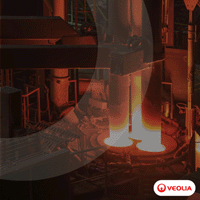China Agrees to End Subsidy Program; Steel Executives Press for Aggressive Enforcement of Trade Laws
04/14/2016 - The U.S. has signed an agreement with China to end a disputed program that subsidized Chinese exports from seven sectors, one of which includes specialty steel.
In a statement, U.S. Trade Representative Michael Froman said the agreement is a win for Americans employed in those sectors and will help to level the playing field.
“This agreement once again underscores President Obama’s commitment to enforce our trade rights aggressively to secure real economic results for American workers, farmers, and businesses of all sizes and in every part of the country,” Froman said.
However, the program’s elimination may have a limited impact, according to The Wall Street Journal.
The Journal reported that U.S. officials have estimated the program amounted to around US$1 billion over three years. For comparison, overall Chinese exports to the U.S. amounted to US$482 billion in 2015, The Journal said.
Nevertheless, there is a “critical need to take action on all fronts against China’s predatory actions, which cause major job losses and serious damage to the American economy,” U.S. Rep. Sander Levin told The Journal. Levin is the ranking member of the House Ways and Means committee.
U.S. officials have been hearing plenty from steelmakers this week on the need to stringently enforce trade laws and to discourage the excess capacity that has been dogging steel markets throughout the world.
In conjunction with the Department of Commerce, the Office of the U.S. Trade Representative convened two days of hearings in Washington, D.C., this week. And the U.S. Congressional Steel Caucus was hearing from labor leaders and steel executives today.
Among those offering testimony was United States Steel Corp. chief executive Mario Longhi, who said that the U.S. must continue to fight unfairly traded imports.
“In the 12 short months since this body last gathered, our industry has continued to suffer serious and demoralizing injury. Let us be clear. The genesis of this crisis is not home-grown, but its profound and crippling impact continues to be visited upon American workers and our communities every day. Moreover, these persistent, illegal foreign practices impact this country’s ability to maintain critical national infrastructure and to preserve our national security,” he said in written testimony.
Back in Pittsburgh, where U. S. Steel is headquartered, U.S. Republican presidential frontrunner Donald Trump told thousands of supporters on Wednesday that U.S. leaders have failed to stem the flow of unfairly traded goods into the country.
“We make better products than China,” he said, according to the (Pittsburgh) Tribune-Review. “The problem is China cheats. ... I'm angry at our leaders for being so damn stupid.”
Trump also delivered a promise to revive the Pittsburgh region’s steel and coal industries.
“Steel, we’re bringing back,” he said, according to the Pittsburgh Post-Gazette newspaper.
“We’re going to build United States Steel back,” Trump said, referring to the Pittsburgh-based company’s decision to lay off one-fourth of its nonunion payroll.
The steel industry no longer dominates southwestern Pennsylvania as it once did. But it hasn’t gone away entirely – U. S. Steel, AK Steel Corp., TMK IPSCO, Allegheny Technologies Inc., Steel Dynamics Inc. and Union Electric Steel all have operations in the region.
Earlier in the week, Trump's Democratic counterpart, Hillary Clinton weighed in with a few steel-related thoughts of her own, issuing a statement condemning China’s continued support of excess steel production. Clinton said that if elected, she would crack down on unfair trade practices.
Among other measures, she would appoint a trade prosecutor who reports to the president and triple the number of trade enforcement officers, she said.
“As president, I’ll aggressively pursue trade cases and impose consequences when China breaks the rules by dumping its cheap products in our markets,” she said.
“This agreement once again underscores President Obama’s commitment to enforce our trade rights aggressively to secure real economic results for American workers, farmers, and businesses of all sizes and in every part of the country,” Froman said.
However, the program’s elimination may have a limited impact, according to The Wall Street Journal.
The Journal reported that U.S. officials have estimated the program amounted to around US$1 billion over three years. For comparison, overall Chinese exports to the U.S. amounted to US$482 billion in 2015, The Journal said.
Nevertheless, there is a “critical need to take action on all fronts against China’s predatory actions, which cause major job losses and serious damage to the American economy,” U.S. Rep. Sander Levin told The Journal. Levin is the ranking member of the House Ways and Means committee.
U.S. officials have been hearing plenty from steelmakers this week on the need to stringently enforce trade laws and to discourage the excess capacity that has been dogging steel markets throughout the world.
In conjunction with the Department of Commerce, the Office of the U.S. Trade Representative convened two days of hearings in Washington, D.C., this week. And the U.S. Congressional Steel Caucus was hearing from labor leaders and steel executives today.
Among those offering testimony was United States Steel Corp. chief executive Mario Longhi, who said that the U.S. must continue to fight unfairly traded imports.
“In the 12 short months since this body last gathered, our industry has continued to suffer serious and demoralizing injury. Let us be clear. The genesis of this crisis is not home-grown, but its profound and crippling impact continues to be visited upon American workers and our communities every day. Moreover, these persistent, illegal foreign practices impact this country’s ability to maintain critical national infrastructure and to preserve our national security,” he said in written testimony.
Back in Pittsburgh, where U. S. Steel is headquartered, U.S. Republican presidential frontrunner Donald Trump told thousands of supporters on Wednesday that U.S. leaders have failed to stem the flow of unfairly traded goods into the country.
“We make better products than China,” he said, according to the (Pittsburgh) Tribune-Review. “The problem is China cheats. ... I'm angry at our leaders for being so damn stupid.”
Trump also delivered a promise to revive the Pittsburgh region’s steel and coal industries.
“Steel, we’re bringing back,” he said, according to the Pittsburgh Post-Gazette newspaper.
“We’re going to build United States Steel back,” Trump said, referring to the Pittsburgh-based company’s decision to lay off one-fourth of its nonunion payroll.
The steel industry no longer dominates southwestern Pennsylvania as it once did. But it hasn’t gone away entirely – U. S. Steel, AK Steel Corp., TMK IPSCO, Allegheny Technologies Inc., Steel Dynamics Inc. and Union Electric Steel all have operations in the region.
Earlier in the week, Trump's Democratic counterpart, Hillary Clinton weighed in with a few steel-related thoughts of her own, issuing a statement condemning China’s continued support of excess steel production. Clinton said that if elected, she would crack down on unfair trade practices.
Among other measures, she would appoint a trade prosecutor who reports to the president and triple the number of trade enforcement officers, she said.
“As president, I’ll aggressively pursue trade cases and impose consequences when China breaks the rules by dumping its cheap products in our markets,” she said.



.png?lang=en-US&ext=.png)






